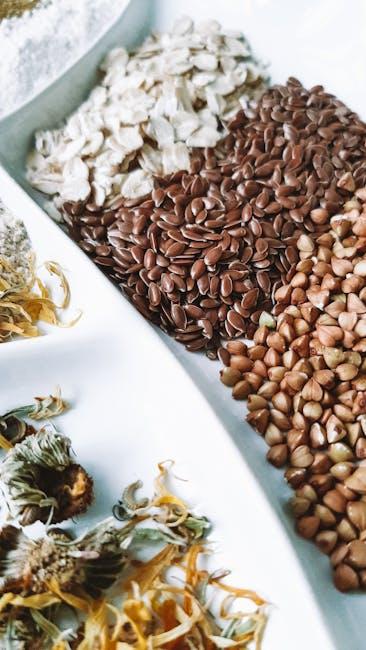In a world where dietary choices are as diverse as the cultures they spring from, the vegetarian lifestyle stands out as both a commitment to ethical consumption and a testament to the vibrant array of plant-based foods. Yet, amid the kaleidoscope of fruits, vegetables, grains, and legumes, a question looms large: should vegetarians be concerned about their protein intake? This query is not merely a matter of nutrition science but a reflection of the broader dialogue on how we nourish our bodies while honoring our values. As we embark on this exploration, we’ll delve into the myths and facts surrounding protein in a vegetarian diet, unraveling the complexities of this essential nutrient and its role in a plant-based lifestyle. Join us as we journey through the garden of vegetarian protein sources, examining whether these choices can meet the body’s needs without compromising the principles that define this way of living.
Understanding Plant-Based Protein Sources
In the quest for maintaining a balanced diet, vegetarians often ponder about the adequacy of their protein intake. Fortunately, nature offers a rich tapestry of plant-based protein sources that are not only diverse but also nutritious. Legumes, such as lentils and chickpeas, stand out as potent protein powerhouses, brimming with essential amino acids. Quinoa, often dubbed a superfood, provides a complete protein profile, making it a favorite among health enthusiasts. Additionally, nuts and seeds—like almonds, chia, and hemp seeds—are not only high in protein but also packed with healthy fats.
- Tofu and Tempeh: Versatile and rich in protein, these soy-based foods can be adapted into a variety of dishes.
- Edamame: Young soybeans that are deliciously protein-packed and easy to snack on.
- Spirulina: A blue-green algae that offers an impressive protein content along with essential nutrients.
For those embracing a vegetarian lifestyle, incorporating a variety of these plant-based sources ensures not just protein adequacy, but also a vibrant and colorful diet. With a little creativity in meal planning, vegetarians can easily meet their protein needs while enjoying the myriad flavors and textures these foods offer.

Balancing Amino Acids for Optimal Health
When considering protein intake, especially for vegetarians, understanding the role of amino acids is crucial. Amino acids are the building blocks of proteins and are vital for numerous bodily functions, from muscle repair to hormone production. Essential amino acids must be obtained through diet, as the body cannot synthesize them. For vegetarians, it’s important to ensure that these essential amino acids are sufficiently included in their daily intake.
- Complete proteins contain all nine essential amino acids in adequate amounts. These are typically found in animal products, but plant-based sources like quinoa, soy, and buckwheat are also complete.
- Complementary proteins can be combined to provide all essential amino acids. A classic example is rice and beans, which together form a complete protein profile.
- Variety is key: Incorporating a diverse range of plant-based foods like legumes, nuts, seeds, and whole grains can help vegetarians achieve balanced amino acid intake.
By being mindful of these protein sources and combinations, vegetarians can maintain optimal health without the need for animal products, ensuring that their dietary choices support their lifestyle and health goals.

Exploring the Myths and Facts of Vegetarian Protein
When it comes to vegetarian diets, one of the most common concerns is whether they provide sufficient protein. Myths abound that plant-based diets lack the protein necessary for a healthy lifestyle. However, this is not entirely accurate. A variety of plant foods are rich in protein and can easily meet the daily requirements. Foods such as lentils, chickpeas, quinoa, and tofu are not only packed with protein but also provide essential amino acids. Additionally, incorporating a diverse range of these protein-rich foods can ensure that vegetarians receive all the necessary nutrients.
- Legumes: Beans, lentils, and chickpeas are excellent sources of protein and fiber.
- Whole Grains: Quinoa, brown rice, and oats can add both protein and essential nutrients to meals.
- Nuts and Seeds: Almonds, chia seeds, and hemp seeds are not only protein-rich but also offer healthy fats.
It’s crucial to debunk the notion that plant-based proteins are inferior. With mindful planning and a variety of choices, vegetarians can achieve a balanced and protein-sufficient diet. The key is to focus on diverse sources and ensure that each meal includes a mix of the options available. Thus, concerns about protein intake for vegetarians can be laid to rest with informed choices and a little culinary creativity.

Practical Tips for Meeting Daily Protein Requirements
Incorporating a variety of plant-based protein sources into your diet is a key strategy for vegetarians to meet their daily protein needs. Legumes such as lentils, chickpeas, and black beans are not only rich in protein but also packed with essential nutrients. Nuts and seeds like almonds, chia seeds, and hemp seeds offer a protein punch along with healthy fats. Additionally, whole grains such as quinoa, farro, and bulgur can significantly boost your protein intake while adding texture and flavor to your meals.
- Tofu and Tempeh: These soy-based products are versatile and can be used in a variety of dishes from stir-fries to salads.
- Dairy or Dairy Alternatives: Greek yogurt, cottage cheese, or fortified plant-based milk can contribute to your protein goals.
- Eggs: For those who include them in their diet, eggs are an excellent and complete protein source.
Remember, combining different protein sources can create a complete amino acid profile, ensuring your body gets all the essential building blocks it needs. It’s also beneficial to spread protein intake throughout the day to support muscle repair and growth.
Concluding Remarks
In the vibrant tapestry of dietary choices, the question of protein intake for vegetarians weaves a particularly intriguing thread. As we’ve journeyed through the nuances of plant-based nutrition, it’s clear that while the path may differ from that of omnivores, it is no less rich in potential. With an array of legumes, grains, nuts, and seeds at their disposal, vegetarians have ample opportunities to meet their protein needs, provided they plan thoughtfully and remain informed. As with any dietary lifestyle, balance and variety are key. So, whether you are a seasoned vegetarian or just beginning to explore this plant-centric world, let curiosity and knowledge guide you. After all, every meal is not just a source of sustenance, but a chance to celebrate the diversity and creativity that a vegetarian diet can offer.




